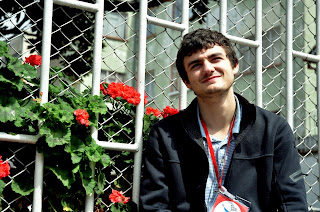Can you believe it's already week #16 of this project? WOW! Today I introduce you to my good friend Esteban from {Buenos Aires, Argentina}. I met Esteban in Italy, and had the privilege of taking his portrait at the very top the Alps. He officially holds the position of portrait at the highest altitude!
Esteban does work with a community in Argentina, the Community of Sant'Egidio, seeking to bridging the vast gaps of inequality that exist in his home spaces.
---
 "The definition of what comes to my mind when I think of justice is the equality of opportunity."
"The definition of what comes to my mind when I think of justice is the equality of opportunity.""I am going to give an example, why I think the definition of justice for me, is equality. I am a member of this community, Community of Sant'Egidio. It is a worldwide community that was born in Rome, but it is also in Argentina. We have this program called School of Peace, for little kids who are living in marginalized neighbourhoods. In English people call it a “tutoring program”, for kids between 6 and 10 years old."
"They live in places that are super violent, and very marginalized. They are kids that are born in families that live in these neighbourhoods and they don't get to choose where to live. I think everyone should deserve the same chances, access to education, food, health. I know that some of them are not eating well nutritionally wise, and that's not helping their upraising, their development. Even though we call it school, it is an informal like-school. Everyone is invited, even though it's a Catholic community we don't ask their denomination – even Muslims. Everybody is invited to work on peace."

"I have many many opportunities. I don't like calling myself rich, because people think rich is money – but I am rich with opportunity, and not money. Right now the kids won't have the same opportunities in the future, and I think that is not fair. I'd like everyone to have the same opportunities. I think that having opportunities is going to change the way you are. I'm convinced about it, I really am."
We also visit elderly in nursing homes. It's nice to know that even though right now my grandparents are not with me I can be adopted by many of the elderly I visit. And with the kids – I'm not married, I don't have kids – but I still have many friends who are little kids. I'm not a father, but I have kids. I have grandparents even though they're not my parents' mother and father. In a way this community helps me grow my family. Even though we don't live together we are a family.So, that's what I do to bring the equality of opportunity to many realities that I encounter. That's my way."

"With this community I have found a way to help overcome this inequality, to bring people together, to bring this equality into reality."
----
Tell me something beautiful you have witnessed in your country
----
Find yourself thinking about this story? Tell us your thoughts!
Tell me something beautiful you have witnessed in your country
"One time we set up a stage in the middle of a park and we had people play music. We brought the kids from the slums of the city into this park, which a is super fancy place in the middle of a residential area. An then we also invited kids from this area. It was beautiful to see kids that would have never been together, be together. Even though they were not wearing the same clothes, and of course they did not share the same interests, they were together, in peace."
"It's very difficult to define peace, but that is peace. Being together over our differences, and realizing that it is really nice. Most of the time I define peace as a feeling, and in that moment I felt really good. It was the beginning of hope, and it was simple to make that moment possible. "
----
Find yourself thinking about this story? Tell us your thoughts!







